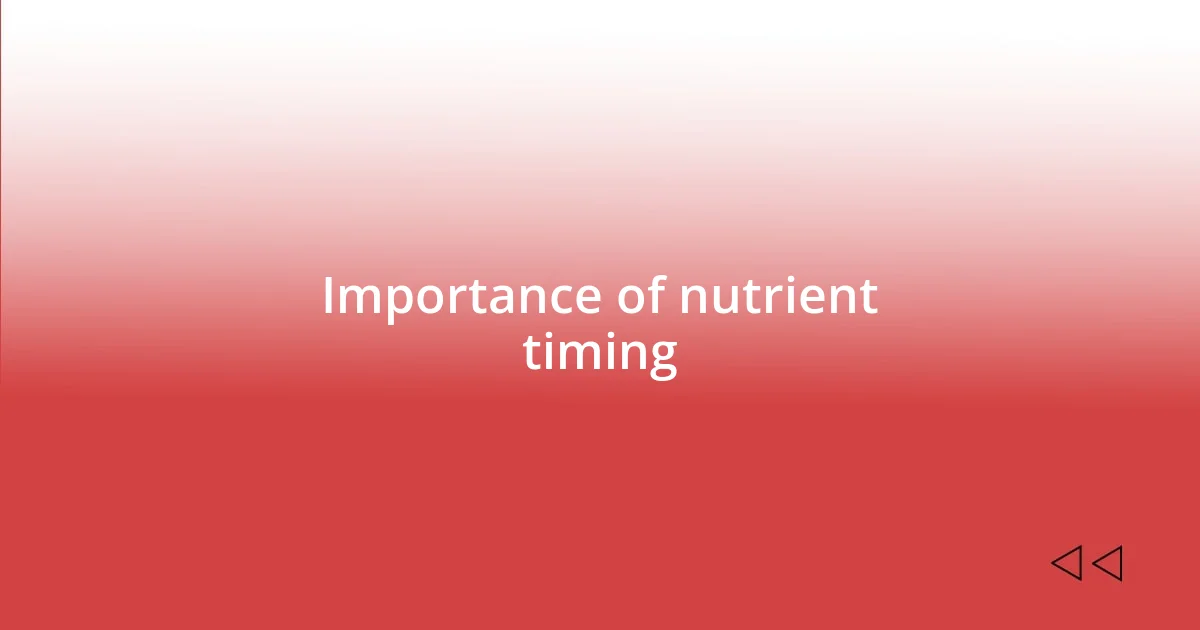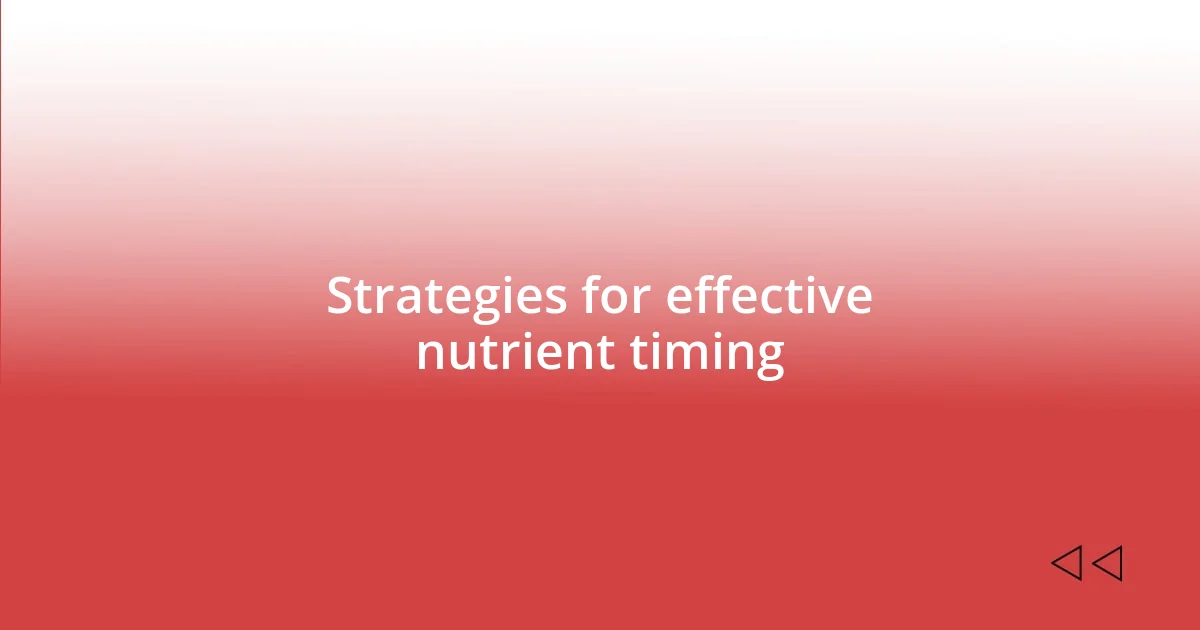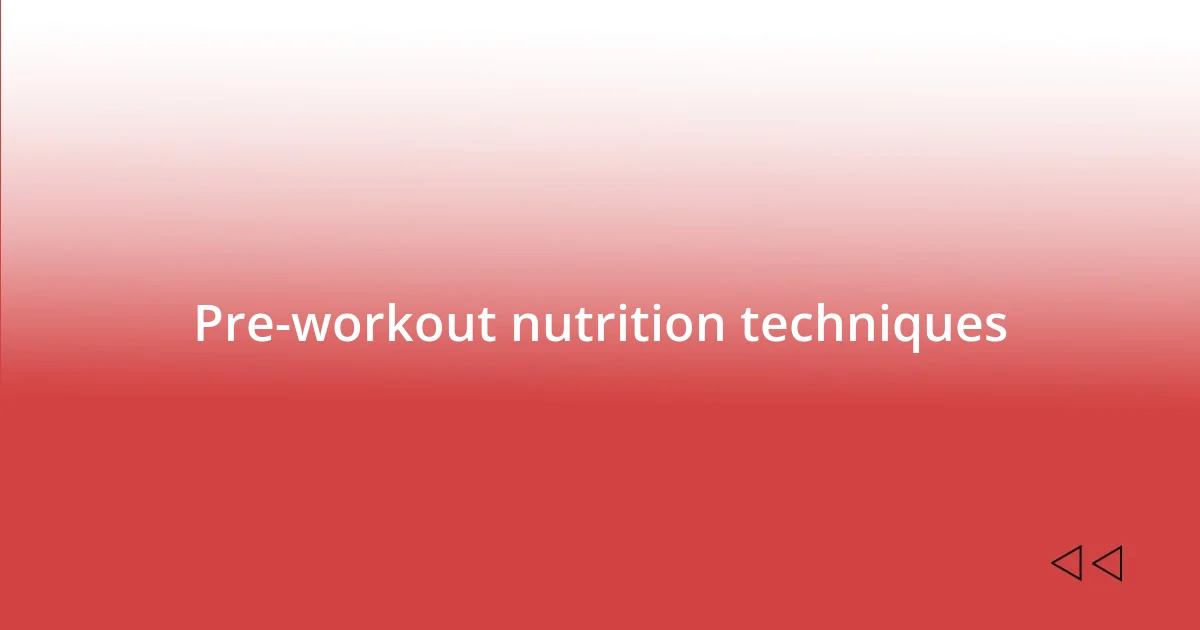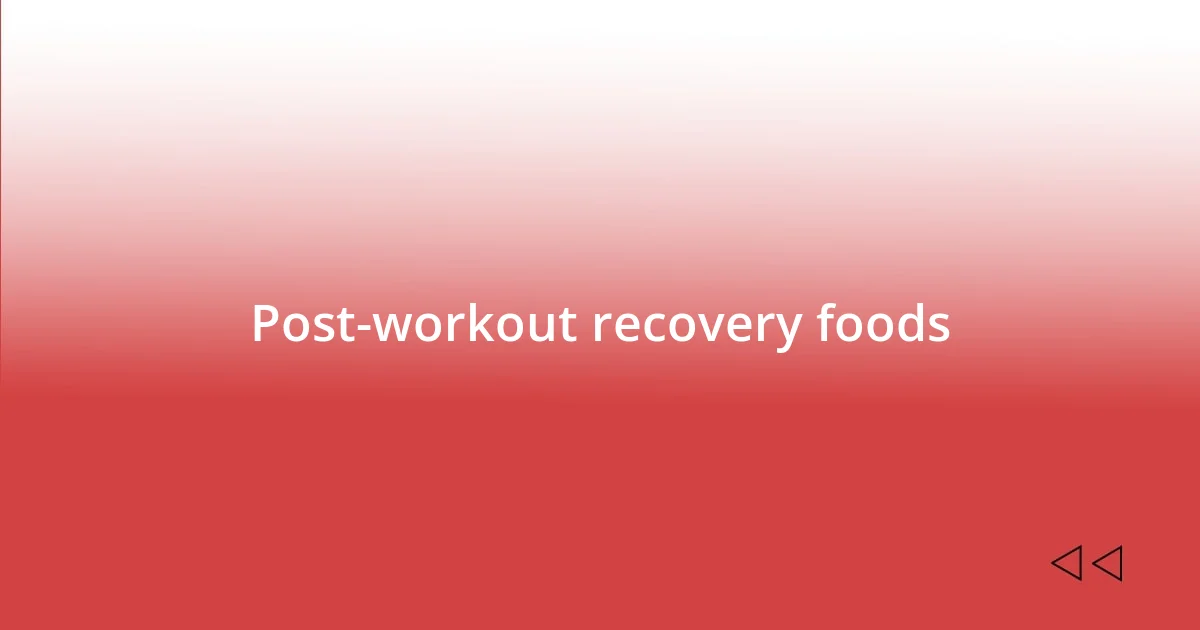Key takeaways:
- Nutrient timing enhances physical performance, recovery, and muscle gain by strategically consuming meals and snacks around workouts.
- Personalized nutrition practices, such as timing carbohydrate and protein intake, can lead to significant improvements in energy levels and workout satisfaction.
- Monitoring results and making adjustments based on body feedback are essential for optimizing nutrient timing and overall performance.

Understanding nutrient timing
Nutrient timing is all about when you consume your meals and snacks in relation to your physical activities. I remember the first time I consciously tried it; I was skeptical but decided to time my carbohydrate intake around my workouts. It made a noticeable difference in my energy levels, and I couldn’t help but wonder—could the timing of my food improve my performance even more?
The focus isn’t just on what you eat but also on the timing that can boost recovery and optimize muscle gain. After a hard workout, I’ve found that having protein immediately afterward can feel like a reward for all that effort. Have you ever felt that satisfying rush of recovery? It’s like giving your body a well-deserved high-five.
Understanding nutrient timing requires paying attention to your own body’s signals. I’ve learned that everyone reacts differently; what works for me might not resonate with you. Have you experimented with your food timing? It can be enlightening to discover how small shifts in when you eat can lead to big changes in how you feel and perform.

Importance of nutrient timing
The timing of nutrient intake can significantly enhance physical performance and recovery. I remember testing out the concept of consuming carbs just before my runs. The boost in stamina was palpable, like a friendly push from the universe saying, “You’ve got this!” I felt a surge of energy that made my workouts not just bearable but enjoyable.
Here are some key reasons why nutrient timing is important:
- Optimizes Performance: Eating the right food at pivotal moments can elevate your performance during workouts.
- Enhances Recovery: Consuming protein and carbs post-exercise aids in faster muscle recovery and repair.
- Promotes Muscle Gain: Timing your protein needs around workouts can help capitalize on muscle-building opportunities.
- Regulates Energy Levels: Strategic meal planning ensures consistent energy throughout the day, preventing fatigue.
- Supports Weight Management: Proper timing can help control hunger and regulate metabolism, contributing to healthier weight management.
I can’t forget those tough training days when I skipped proper fueling just for convenience. The difference on days I honored my body’s timing was like night and day. It’s all about understanding what your body needs when, and I’ve learned to embrace that rhythm.

My personal nutrition goals
My nutrition goals have always centered around maximizing my energy and recovery. I set out to focus on how and when I consumed nutrients, especially my meals surrounding workouts. For instance, I’ve had days when I would skip breakfast, only to feel sluggish during my afternoon run. Now, I prioritize a balanced meal before exercise, as it truly fuels my performance—like hitting the sweet spot before a race.
Refining my approach has also involved tweaking my post-workout nutrition. I remember one evening after an intense strength session, I opted for a protein shake instead of my usual low-carb snack. The rush of satisfaction I felt while sipping that shake made me realize how significant that recovery phase is. That experience taught me the power of not just recovery but also of intentional choices aligning with my goals.
To me, the essence of these nutrition goals is about finding what feels right for me personally.
| Nutrition Goal | Personal Experience |
|---|---|
| Fueling Workouts | Eating a balanced breakfast before an afternoon run boosts my energy levels significantly. |
| Post-Workout Recovery | Switching to a protein shake after strength training made a noticeable difference in how I felt afterward. |

Strategies for effective nutrient timing
I’ve found that timing my carbohydrate intake around workouts has been a game changer. I often enjoy a small snack, like a banana, about 30 minutes before exercise. This simple choice provides an instant boost, making my workout feel almost effortless. Isn’t it amazing how something so small can transform a grueling session into a euphoric experience?
Another strategy I’ve embraced is the post-workout window. Consuming protein and carbs within that golden hour is crucial. I’ve made it a habit to prepare a smoothie with protein powder, spinach, and some frozen fruit right after working out. That blend not only tastes good but leaves me feeling revitalized and ready for whatever comes next. Have you ever thought about how nourishing your body after a workout can be more rewarding than the workout itself?
I also believe in understanding your own body’s rhythms is key to nutrient timing. For instance, I’ve learned that eating larger meals earlier in the day fuels my activities more effectively. I still recall feeling sluggish on days when I overindulged late at night. What works for me might not work for everyone, but finding that unique balance is vital. How do you tune into your body’s needs?

Pre-workout nutrition techniques
One technique I’ve found exceptionally helpful is eating a small, nutritious snack about 30 minutes prior to working out. I remember one day when I grabbed a handful of almonds and a few dried cherries before hitting the gym. It was amazing how that little boost of healthy fats and carbs propelled me through my routine, leaving me feeling energetic and focused. Have you ever noticed how something as simple as a snack can shift your workout experience from struggle to strength?
Another approach I explore involves tailoring my pre-workout meals based on the intensity of my upcoming workout. I recall a day when I had a big leg day planned, so I prepped a light meal of oatmeal topped with banana and a sprinkle of cinnamon. It felt like the perfect blend of carbs and natural sugars, and I crushed my workout! Don’t you think understanding what your body needs before a big session can make all the difference in performance?
I’ve also started experimenting with hydration techniques before exercising. I always make sure to drink water or an electrolyte drink about an hour before my workout. I faced a hard lesson once—pushing through a challenging run without adequate hydration left me feeling dizzy and drained halfway through. Now, I can’t help but smile in anticipation as I sip my water, knowing it prepares me for the challenges ahead. What’s your hydration game plan?

Post-workout recovery foods
I’ve discovered that not all post-workout foods are created equal. After an intense gym session, I reached for a classic—Greek yogurt topped with honey and berries. With its creamy texture, it felt like a delicious reward, and I could feel the protein and carbs working their magic to speed up my recovery. Have you ever savored a moment post-workout like that, where every bite feels like a celebration of your effort?
One time, I went a bit rogue and decided to experiment with a savory post-workout meal: a whole grain wrap with turkey, avocado, and lots of fresh veggies. Not only was it satisfying, but the healthy fats and protein helped me feel full longer. I can still remember the mix of flavors exploding in my mouth, and that was the moment I realized that recovery doesn’t have to be boring. What’s your go-to meal that makes you feel good and fuels your recovery?
I also make it a point to incorporate hydration into my recovery routine, often opting for coconut water or a homemade electrolyte drink. There have been times when I overlooked this, and let me tell you—a lingering dehydration headache after an intense workout is something I don’t wish on anyone. Now, I prioritize my post-workout fluids just as much as my food choices, and that feeling of replenishing my body adds a special satisfaction. How do you ensure you’re fully rehydrated after breaking a sweat?

Monitoring results and adjustments
As I began focusing on nutrient timing, I quickly learned how crucial it is to monitor my results. I remember sitting down with my journal after a week of workouts and meals, analyzing how I felt and performed. It was surprising to see the direct impact my food choices had on my energy levels. Have you ever noticed how your body reacts differently based on what you fuel it with?
Adjustments inevitably became part of my journey. After a particularly sluggish workout that coincided with a heavy lunch, I realized I needed to switch things up. I started experimenting with meal timing, sometimes eating lighter meals a few hours before a session. The difference was momentous! I felt lighter and more agile—almost like a cloud had lifted. Have you ever changed your routine and experienced a breakthrough?
Tracking my hydration alongside my nutrient intake also proved essential. I found that plotting my fluid consumption daily helped me pinpoint when I was slipping into dehydration, especially during hot workouts. I can still recall a workout where I felt fantastic until I suddenly crashed. Now, I pay close attention to how my body tells me it needs more water, and maintaining that balance helps me stay energized and engaged. What have you discovered about your hydration needs during your fitness journey?















